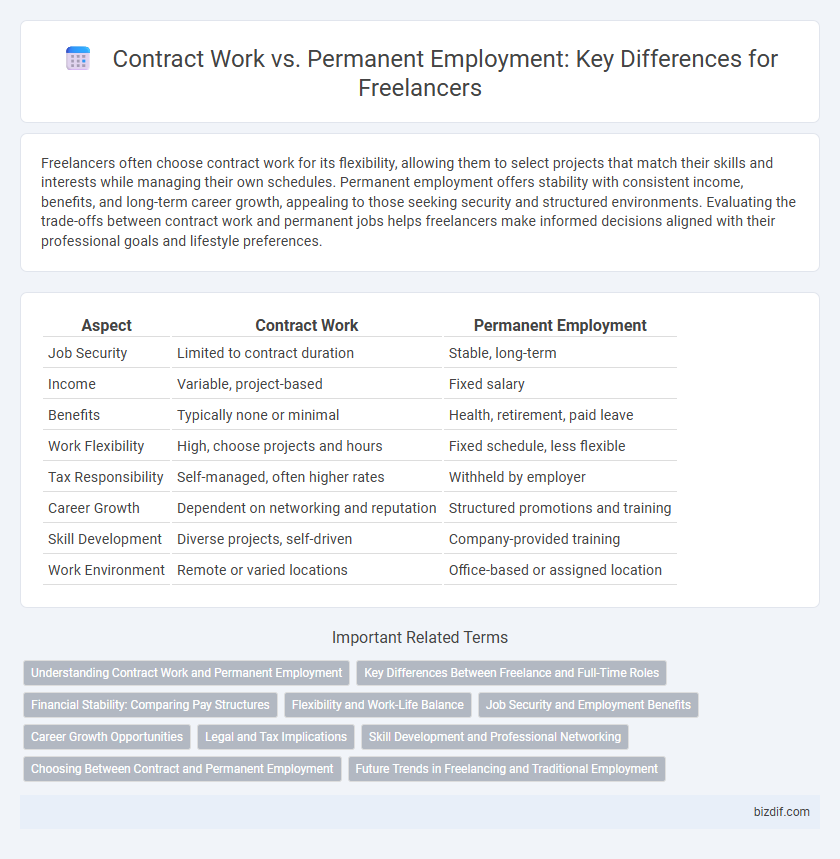Freelancers often choose contract work for its flexibility, allowing them to select projects that match their skills and interests while managing their own schedules. Permanent employment offers stability with consistent income, benefits, and long-term career growth, appealing to those seeking security and structured environments. Evaluating the trade-offs between contract work and permanent jobs helps freelancers make informed decisions aligned with their professional goals and lifestyle preferences.
Table of Comparison
| Aspect | Contract Work | Permanent Employment |
|---|---|---|
| Job Security | Limited to contract duration | Stable, long-term |
| Income | Variable, project-based | Fixed salary |
| Benefits | Typically none or minimal | Health, retirement, paid leave |
| Work Flexibility | High, choose projects and hours | Fixed schedule, less flexible |
| Tax Responsibility | Self-managed, often higher rates | Withheld by employer |
| Career Growth | Dependent on networking and reputation | Structured promotions and training |
| Skill Development | Diverse projects, self-driven | Company-provided training |
| Work Environment | Remote or varied locations | Office-based or assigned location |
Understanding Contract Work and Permanent Employment
Contract work involves temporary assignments defined by specific project goals and durations, offering flexibility and diverse opportunities but often without traditional employee benefits. Permanent employment provides long-term job security, steady income, and comprehensive benefits such as health insurance and retirement plans, fostering deeper organizational integration. Understanding these distinctions helps professionals choose based on career goals, financial stability, and work-life balance preferences.
Key Differences Between Freelance and Full-Time Roles
Freelance contract work offers flexibility, project-based assignments, and varying income streams, contrasting with permanent employment's consistent salary, benefits, and job security. Freelancers manage their own taxes, client relationships, and workload, while full-time employees benefit from employer-provided resources and structured career progression. The autonomy of freelance roles often demands strong self-discipline and networking skills, which differ significantly from the predictable routines in permanent positions.
Financial Stability: Comparing Pay Structures
Contract work offers variable pay structures with potential for higher hourly rates but often lacks benefits like health insurance and retirement plans, impacting long-term financial stability. Permanent employment provides consistent salaries, predictable income, and comprehensive benefits that support financial planning and security. Freelancers must manage irregular cash flow and invest in personal benefits to maintain financial stability comparable to salaried employees.
Flexibility and Work-Life Balance
Contract work offers unmatched flexibility, allowing freelancers to set their own schedules and choose projects that align with personal priorities, directly enhancing work-life balance. Permanent employment typically involves fixed hours and structured environments, which may limit individual control over time but provides consistent income and benefits. Prioritizing flexibility in contract roles supports improved mental health and productivity by enabling a customized work-life integration.
Job Security and Employment Benefits
Contract work offers flexibility but typically lacks job security and traditional employment benefits such as health insurance, retirement plans, and paid leave. Permanent employment provides consistent income, greater job stability, and access to comprehensive benefits packages that support long-term financial and personal well-being. Many freelancers weigh the trade-offs between the autonomy of contract roles and the security and perks of full-time positions.
Career Growth Opportunities
Contract work offers flexible career growth opportunities by enabling freelancers to gain diverse skills across multiple industries and projects, accelerating professional development. Permanent employment provides structured advancement paths with consistent mentorship, training programs, and internal promotion prospects within a single organization. Evaluating career goals and preferred learning environments is crucial for maximizing growth potential in contract work versus permanent roles.
Legal and Tax Implications
Contract work offers freelancers greater control over tax deductions and business expenses, often classified as independent contractors subject to self-employment tax, whereas permanent employment provides employer-managed tax withholdings and benefits like social security contributions. Legal obligations differ as contract workers must adhere to specific contract terms and lack employment protections such as overtime pay or unemployment insurance, while permanent employees are covered by labor laws ensuring job security and workplace rights. Understanding these distinctions is crucial for managing liabilities, compliance with tax authorities, and optimizing financial planning in freelancing careers.
Skill Development and Professional Networking
Contract work often accelerates skill development by exposing freelancers to diverse projects and industries, enhancing adaptability and technical expertise. Permanent employment fosters deep specialization within a particular field or company, offering structured training and long-term mentorship opportunities. Networking in contract roles tends to be broader and more varied, while permanent positions build more stable, long-lasting professional relationships within a consistent environment.
Choosing Between Contract and Permanent Employment
Choosing between contract work and permanent employment depends on individual priorities such as job stability, flexibility, and income consistency. Contract positions offer higher earning potential and project variety but lack long-term security and benefits like health insurance or retirement plans commonly found in permanent roles. Evaluating personal career goals, financial needs, and risk tolerance helps freelancers make informed decisions about the optimal employment type.
Future Trends in Freelancing and Traditional Employment
Contract work in freelancing is projected to grow significantly, driven by businesses seeking flexibility and specialized skills for short-term projects. Meanwhile, permanent employment continues to evolve with hybrid models blending remote work and traditional office settings, reflecting changing workforce preferences. Emerging technologies and shifting economic conditions will further blur the lines between freelancing and permanent roles, fostering dynamic career pathways.
Contract Work vs Permanent Employment Infographic

 bizdif.com
bizdif.com